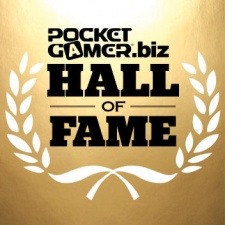If you don't know who Luke Muscat is, you'll definitely have seen his influence on the mobile games space.
He was the lead designer on Australian studio Halfbrick's Fruit Ninja. The mobile sensation has been downloaded by hundreds of millions of players.
According to App Annie, it's the second most downloaded App Store game of all time.
Not bad for a man who nearly had a career in economics, but for discovering game development at a university open day.
He's now working at his own studio, the Brisbane-based Prettygreat, formed by his ex-Halfbrick colleagues Phil Larsen and Hugh Walters.
The studio has released two titles in Land Sliders and Slide the Shakes as Muscat and the team try to recapture the magic of Fruit Ninja.

PocketGamer.biz: What were your favourite games as a kid?
Luke Muscat: Growing up, we didn’t have much money, so usually our consoles were ‘hand me downs’ from neighbours or family friends. When the neighbours upgraded to the SNES, we got our first NES.
With the Nintendo 64 though, that all changed. We got an N64 for Christmas the year it came out, and I was completely obsessed. I was consumed by Goldeneye, Mario 64 and then Perfect Dark.
Fruit Ninja created lots of jobs in our local industry, at a time when it seemed that there may be no industry left in Brisbane.
Perfect Dark was actually my very first foray into “designing” things for games. I would spend hours tooling around with the Combat Simulator to try and make interesting multiplayer scenarios.
Later, when we got our first dial up connection, I got into Worms: Armageddon in a big way.
It had a level editor that let you paint a black and white bitmap in MSPaint and then import and play it online. This was when I really got into design, creating maps and playing and sharing them online.
When did you realise you wanted to make games as a career?
Through high school I had always wanted to be a vet. That was, until I did work experience at the local veterinarian. So much blood and poop and sadness. I couldn’t deal with it.
Then I decided I wanted to get into economics, as it was my favorite subject at school. I love economics because it is effectively about human behaviour and systems interacting, not unlike video games as it turns out.
I had already applied for a bunch of economics courses at university when our class was taken for a trip to a university open day, where you could get more information about the courses and different universities.
Tucked up way in the corner was this tiny little booth with the sign “Get a career making video games”.
They had an Xbox set up, and a couple of flyers. My mind just exploded. I was like “Holy shit, making video games is a career?!”.
Somehow it had never even occurred to me that this was a possibility.
Three hours after starting at Halfbrick, I got moved onto a team that was finishing up a PSP game.Luke Muscat
As soon as I got home I changed all of my applications over to any video game-related course I could find!
What was your first role in the industry? How did that turn out?
After university, I got a job as a junior designer at a small local studio that no one had ever heard of called Halfbrick.
It was less than a mile away from where I had been studying for four years, and I hadn’t even heard the name until one of my other friends got an internship there!
The day that I started there, someone found out that I was pretty handy with Flash.
So three hours after starting at the company, I got moved onto a team that was finishing up a PSP game that needed 30-plus mission briefings animated all in Flash!
So, weirdly, even though I was hired as a designer, my first game credit is as an artist on the PSP game Heatseeker.
What do you consider your first significant success?
Fruit Ninja I think is the obvious one here.
I believe it is a success by any measure you hold it up against. I was very happy with the design, which was quite innovative and novel at the time.
And I was and still am super proud of my team - Steve Last and Shath, who together have just released an excellent game called Steppy Pants - who did incredible work on an insanely short time scale. Those guys are the best.
Moreover, Fruit Ninja became a vehicle that allowed us to do all kinds of good stuff.
We spent time working on a special version of Fruit Ninja that was used in hospitals as a part of stroke patient rehabilitation.
It also created lots and lots of jobs in our local industry, at a time when it seemed that there may be no games industry left in Brisbane, or even Australia!
During the GFC, over 60 percent of the Australian games industry lost their jobs.
When did the potential for mobile games become apparent to you?
For me it was the release and success of Flight Control, made by a another Australian studio, Firemint.
It made me realise that there was a healthy market here, and a chance for novel and exciting new game ideas.
The “middle class” of mobile gaming studios is going to shrink. It will be about the small, nimble indies and the big players.
It also showed us a clear way forward for Australia to be able to compete globally.
What do you think is the most significant event in mobile gaming to-date?
I think all the obvious ones are the launch of the App Store, the rise of F2P and so forth.
So instead, I will say the release of Desert Golfing on iOS. I 100 percent believe its the most culturally important game to be released on any mobile platform.
On top of being a good game, its ultra-sparse aesthetic holds a mirror up to the design trends of an industry obsessed with extrinsic motivations. Or something like that.
Mostly I just want to talk about Desert Golfing.
What are you most proud of? Any regrets?
Starting our own studio, Prettygreat.
It’s been the most challenging, stressful, rewarding and overall positive part of my career.
If anything, I regret not doing it sooner!
Which mobile games have you most enjoyed recently and why?
Today I’m playing the hell out of Rodeo Stampede by my friends at Featherweight.
The game has such an amazing loop, its basically an endless runner collect-a-thon with a zoo-based meta game on top. Its amazing. I'm not getting much work done actually, it may be a bit of a problem.
Oh and I still play True Skate every single day. I would have well over 2,000 hours logged on that sucker.
What are your predictions for the future of mobile games?
The “middle class” of mobile gaming studios is going to shrink.
More and more it will be about the small, nimble indies who can knock out innovative work super-fast, and the big players such as Supercell.
In which area of the industry do you hope to make a difference in future?
I’m always passionate about pushing new ideas and innovations in controls and core mechanics.
I just want to keep on designing cool new stuff that people haven’t played before!
Starting out in simple monochrome in the days of Snake and WAP, the past decade has seen the mobile games industry kaleidoscope into a glorious, multi-billion dollar sector that's driving global innovation.
So it's high time we celebrate some of the people who helped make that journey possible - something PocketGamer.biz is doing in its regular Mobile Gaming Hall of Fame feature.
You can read our previous Hall of Fame articles here.

















